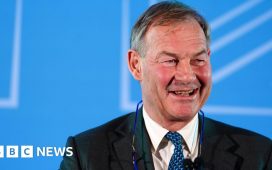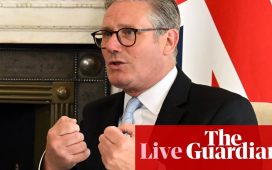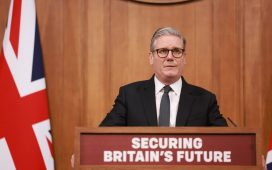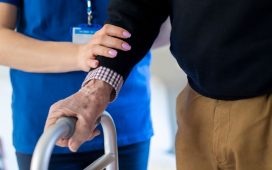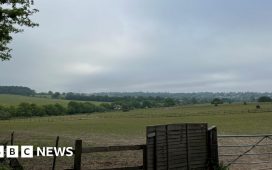Hancock denies being liar and says Cummings to blame for ‘toxic culture’ in No 10
Keith asks why people like Dominic Cummings thought Hancock was a liar?
“I was not,” says Hancock. He says no one in his department has supported these false allegations.
And people did not say this to him at the time, he says.
Keith says the inquiry has no interest in the allegation that Johnson considered sacking Hancock, because it will not be possible to get to the truth of what happened.
Hancock says the inquiry could get to the truth of this matter if it wanted to.
He says the “toxic culture” in No 10 was essentially caused by Cummings.
He describes Cummings as a “malign actor”.
He says Cummings made the situation unpleasant, and he made things unpleasant for his (Hancock’s) staff too.
But he just got on with things, he says.
Key events
Simon Stevens, the former head of NHS England, told the Covid inquiry earlier this month that Matt Hancock thought that, if decisions had to be taken about which patients should prioritised in the event of the NHS being overwhelmed, that should be a decision for ministers (ie him), not doctors.
Asked about this during the hearing this morning, Hancock rejected this claim. He said:
The minutes [from Nimbus, a planning exercise in 2020] do show that the NHS asked the question of how to prioritise when there is insufficient NHS capacity and there was a debate around that as you can see in the minutes, and then I concluded that it should be for clinicians, not for ministers, to make a decision on this basis and that’s how we went on and proceeded. The minutes are really clear on that and that’s also my clear recollection.
Hancock also said that the “really important” lesson of Exercise Nimbus had been that “there was no way we could allow the NHS to become overwhelmed”.
Starmer pays tribute to Darling, saying his ‘calm expertise and honesty’ helped UK through financial crisis
Keir Starmer has paid tribute to Alistair Darling. The Labour leader said:
I am deeply saddened to learn of the passing of Alistair Darling. My heart goes out to his family, particularly Maggie, Calum and Anna, whom he loved so dearly.
Alistair lived a life devoted to public service. He will be remembered as the chancellor whose calm expertise and honesty helped to guide Britain through the tumult of the global financial crisis.
He was a lifelong advocate for Scotland and the Scottish people and his greatest professional pride came from representing his constituents in Edinburgh.
I consider myself incredibly fortunate to have benefited from Alistair’s counsel and friendship. He was always at hand to provide advice built on his decades of experience – always with his trademark wry, good humour.
Alistair will be missed by all those whose lives he touched. His loss to the Labour party, his friends and his family is immeasurable.
Newly homeless families now outnumber newly built social homes by six to one, according to official figures for England released this morning that expose the widening gap between increasing need and the availability of cheap homes. Robert Booth has the story.
Former Labour chancellor Alistair Darling has died, aged 70, his family says
Alistair Darling’s family issued a statement saying:
The death of Alistair Darling, a former chancellor of the exchequer and long-serving member of the Labour cabinet, was announced in Edinburgh today.
Mr Darling, the much-loved husband of Margaret and beloved father of Calum and Anna, died after a short spell in Western General hospital under the wonderful care of the cancer team.

The Covid inquiry has now stopped for lunch. The hearing will resume at 1.45pm.
Turning away from the Covid inquiry, Alistair Darling, the former Labour chancellor, has died, PA Media reports.
Dominic Cummings has tweeted again about Hancock’s evidence. He claims Hancock is wrong about asymptomatic transmission. (See 11.45am.) For once, he is not accusing Hancock of lying; he just claims Hancock is “confused”.
Hancock talking rubbish on asymptomatic
1/ it’s in the whatsapp group 11/3 Hancock claiming tests don’t work on asymptomatic & Vallance telling him ‘wrong’ tests DO work – Hancock kept repeating this false idea (badly confusing the PM on the issue & he repeated the misinformation to Cabinet, cf. minutes)
2/ me saying 19/3 we shd do a *large scale random national survey* precisely cos it was crucial to figure out *the asymptomatic rate*, which wd help the whole world not just the UK – Vallance agreed with this idea & we did it with ONS
3/ NERVTAG in JANUARY. If he’d read the report (his job) he’d have known then
Hancock, Trolley, & Sedwill statements to inquiry show they STILL do not understand their own misconceptions on this subject in Q1-Q2 2020 (I think here Hancock was genuinely confused / rubbish, not lying)
Hancock talking rubbish on asymptomatic
1/ it’s in the whatsapp group 11/3 Hancock claiming tests don’t work on asymptomatic & Vallance telling him ‘wrong’ tests DO work – Hancock kept repeating this false idea (badly confusing the PM on the issue & he repeated the…— Dominic Cummings (@Dominic2306) November 30, 2023
Keith asks why ministers were told there was a 10% chance of the reasonable worst-case scenario happening when they were also told there was a 50% chance of Covid escaping China.
Hancock says that 10% chance was a consequence of two things – the 50% chance of Covid getting out of China, and how it would then develop. He says when Sars spread, the reasonable worst-case scenario did not materialise.
Q: Why was the reasonable worst-case scenario still be debated in early March long after it became clear the virus was coming, and measures needed to be taken to stop it?
Hancock says that is not how he remembers it.
The government decided to take the reasonable worst-case scenario as the planning assumption, he says.
Hancock says he wanted to call a Cobra meeting in January, but at first No 10 would not allow that. He says he also wanted to make a statement to parliament at this point, but No 10 said no.

Hancock says Cummings created ‘culture of fear’ in No 10 which undermined effectiveness of Covid response
Q: Do you think Cummings had too much influence on decision making in No 10?
Yes, says Hancock.
He says in February Cobra was meeting to deal with Covid.
But Cummings decided to circumvent these meeting by arranging for the key decisions to be taken at a different meeting taking place in his office, he says. He says some of the right people were at those meetings, but not all of them.
Q: Do you think Cummings’ role had a significant impact on the smooth running of the government machine?
“Yes, of course,” says Hancock.
Q: How was this allowed to continue?
Hancock says this was “deeply, deeply frustrating”.
There was a structural problem – Cummings trying to take control of the meetings.
But there was also a cultural problem, he says. He suggests Cummings created a culture of fear. He says Cummings effectively got Sajid Javid sacked as chancellor in February.
Keith tries to close down this point, saying it is not relevant.
Hancock insists this is relevant. He explains:
It inculcated a culture of fear, whereas what we needed was a culture where everybody was brought to the table and given their heads to do their level best in a once-in-a-generation crisis. The way to lead in a crisis like this is to give people the confidence to do what they think needs to happen. And it caused the opposite of that.
UPDATE: Hancock said:
As the Cobra system was running in February, the prime minister’s chief adviser decided that he didn’t like the Cobra system – that’s on the record – and he decided instead to take all of the major daily decisions into his office and he invited a subset of the people who needed to be there to these meetings.
He didn’t invite any ministers. He didn’t regard ministers as a valuable contribution to any decision-making as far as I could see in the crisis or, indeed, any other time.
The reason these meetings are important is because there is a proper government emergency response system and it was actively circumvented and in one of these early meetings the chief adviser said decisions don’t need to go to the prime minister.
Now that is inappropriate in a democracy. I saw it simply as essentially a power-grab but it definitely got in the way of organising the response for the period it was in operation.
Hancock denies being liar and says Cummings to blame for ‘toxic culture’ in No 10
Keith asks why people like Dominic Cummings thought Hancock was a liar?
“I was not,” says Hancock. He says no one in his department has supported these false allegations.
And people did not say this to him at the time, he says.
Keith says the inquiry has no interest in the allegation that Johnson considered sacking Hancock, because it will not be possible to get to the truth of what happened.
Hancock says the inquiry could get to the truth of this matter if it wanted to.
He says the “toxic culture” in No 10 was essentially caused by Cummings.
He describes Cummings as a “malign actor”.
He says Cummings made the situation unpleasant, and he made things unpleasant for his (Hancock’s) staff too.
But he just got on with things, he says.
Keith shows the inquiry minutes from a cabinet meeting on 11 March 2020 showing Matt Hancock as saying testing people who were asymptomatic would not work.

Hancock says he was talking at this point about the case for testing people as borders. Testing would not work because it would not pick up all cases, he suggests.
He says this is not the same as saying testing asymptomatic people might have value in other circumstances.
Dominic Cummings, who was Boris Johnson’s chief adviser for most of 2020, and who has been one of Hancock’s strongest critics, claims Hancock if lying to the inquiry about calling for a lockdown on Friday 13 2020. (See 11am.) He has put this on X.
Hancock flat out lying to Inquiry claiming he privately pushed for lockdown on 13th with PM – but admits there’s no evidence for it – and again on 14th in mtngs – when evidence from ALL others & paper trail is that he was still pushing Plan A herd immunity 13-15th – and his Perm Sec was still pushing Plan A on 18/3 to Cabinet Secretary (email uncovered by media) – the reason I physically stopped him coming to the second mtng on 14/3 was cos he was arguing AGAINST a change of plan & bullshitting everybody about herd immunity & ‘best prepared in the world’ (see evidence from multiple witnesses)
Hancock flat out lying to Inquiry claiming he privately pushed for lockdown on 13th with PM – but admits there’s no evidence for it – and again on 14th in mtngs – when evidence from ALL others & paper trail is that he was still pushing Plan A herd immunity 13-15th – and his Perm…
— Dominic Cummings (@Dominic2306) November 30, 2023
Keith shows an exchange of messages between Sir Patrick Vallance, the chief scientific adviser, and Prof Sir Chris Whitty, the chief medical adviser, in July 2020. In it, Vallance says he does not know why Boris Johnson and Hancock were claiming they were not told about asymptomatic transmission.

Hancock says he and Johnson were not complaining about not being told about the possibility of asymptomatic transmission. They were complaining about the scientists not treating it as the norm. He says the messages in this exchange show the scientists were not certain.
Hancock says his ‘single biggest regret’ is not insisting on policy being based on assumption of asymptomatic transmission
Keith says he wants to talk about asymptomatic transmission.
He says Hancock says in his witness statement that his biggest regret was not pushing for asymptomatic transmission as being the baseline assumption.
He asks Hancock to confirm that he is saying he wishes he had been told about asymptomatic transmission earlier, when it really mattered.
Hancock confirms that.
Keith shows a document from 27 January 2020 says the chief medical officer, Chris Whitty, said at the time that he could not be sure asymptomatic transmission was not happening.

He shows another minute from the following day quoting Whitty as saying there was credible evidence of asymptomatic transmission in Germany.

He shows minutes from a Sage (Scientific Advisory Group for Emergencies) meeting in early February discussing asymptomatic transmission as a factor.

And he shows another minute from a Sage meeting later in February. NF is Neil Ferguson and JE is John Edmunds; they are both epidemiologists.

Hancock accepts this evidence. He says his “single biggest regret” is that he did not push harder on this issue.
He says the scientists worked on the assumption that the transmission mechanism was the same as it was for Sars. He says he now thinks he should have over-ruled the scientists, and said policy should be based on the assumption that Covid was transmitted asymptomatically.
UPDATE: PA Media reports:
Hancock said there was a “fog of uncertainty” about asymptomatic transmission of Covid-19 that he found “deeply frustrating”.
He said: “I was in the pro-let’s worry about asymptomatic transmission camp. The frustration was that, understandably from their point of view, and here I’m putting myself in their shoes, the PHE scientists said we have not got concrete evidence.”
Asked whether the government should have been aware of the possibility of asymptomatic transmission, he said he had “a significant amount of anecdotal evidence”, but “the scientific advice required, or formally advised, policy should be based on the assumption of no asymptomatic transmission” …
When asked what measures could have been introduced if the advice had been clearer, Hancock said: “It made a difference in terms of how infection prevention and control was done within health and care settings. That is very clear.”

